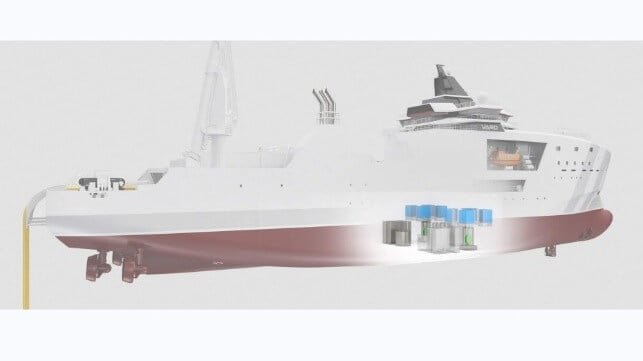Norway’s NuProShip Project Enters Second Phase in Pursuit of Nuclear-Powered Ships
Norway’s NuProShip (Nuclear Propulsion in Shipping) project is advancing into its second stage in January 2025 after completing initial studies on Generation IV reactors. The project, initiated in 2023, aims to develop a commercially viable zero-emission technology for deep-sea vessels.
The Research Council of Norway has granted nearly $1 million (NOK 10 million) in funding for the project, which has garnered support from leading companies in the shipping industry. Partners include DNV, Knutsen Tankers, the Norwegian Maritime Administration, and Spanish nuclear consultancy IDOM. Shipbuilder VARD has announced its participation in the project’s second phase, slated to run until the end of 2025.
Exploring Nuclear Reactor Concepts
The project initially focused on approved designs with a power range of 25 to 55 MW. In the first phase, various nuclear reactor concepts within the Generation IV domain were studied for feasibility. Following an extensive assessment of concepts from 99 companies, three reactor types were selected for further analysis.
Two of the chosen concepts utilize TRISO fuel particles, known for their resilience, in conjunction with a Fluoride high-temperature molten salt reactor or a helium-cooled gas reactor. The third concept involves smaller variants of the lead-cooled reactor design using uranium oxide as fuel.
Reviving Interest in Nuclear-Powered Propulsion
The shipping industry has exhibited a growing interest in nuclear-powered propulsion, a concept first explored decades ago. While the US successfully built the NS Savannah, a prototype passenger-cargo ship, concerns over reactor safety and the navy’s focus on nuclear propulsion hindered commercial applications. Russia remains a primary user of nuclear propulsion for its icebreakers.
Future Phases and Prototyping
The upcoming phase of the NuProShip project will involve collaboration with insurance companies to further evaluate the viability of nuclear technology in shipping. The selected reactor concepts will undergo in-depth analysis in the second phase, focusing on feasibility, safety, costs, waste management, and other factors.
VARD’s key role in the project includes integrating reactor concepts into various vessel types and addressing technical challenges for future commercial use of nuclear-powered ships. The third phase will entail developing and testing a prototype, consolidating findings on economic and environmental impacts, risks, and future development requirements for nuclear-powered merchant vessels.

